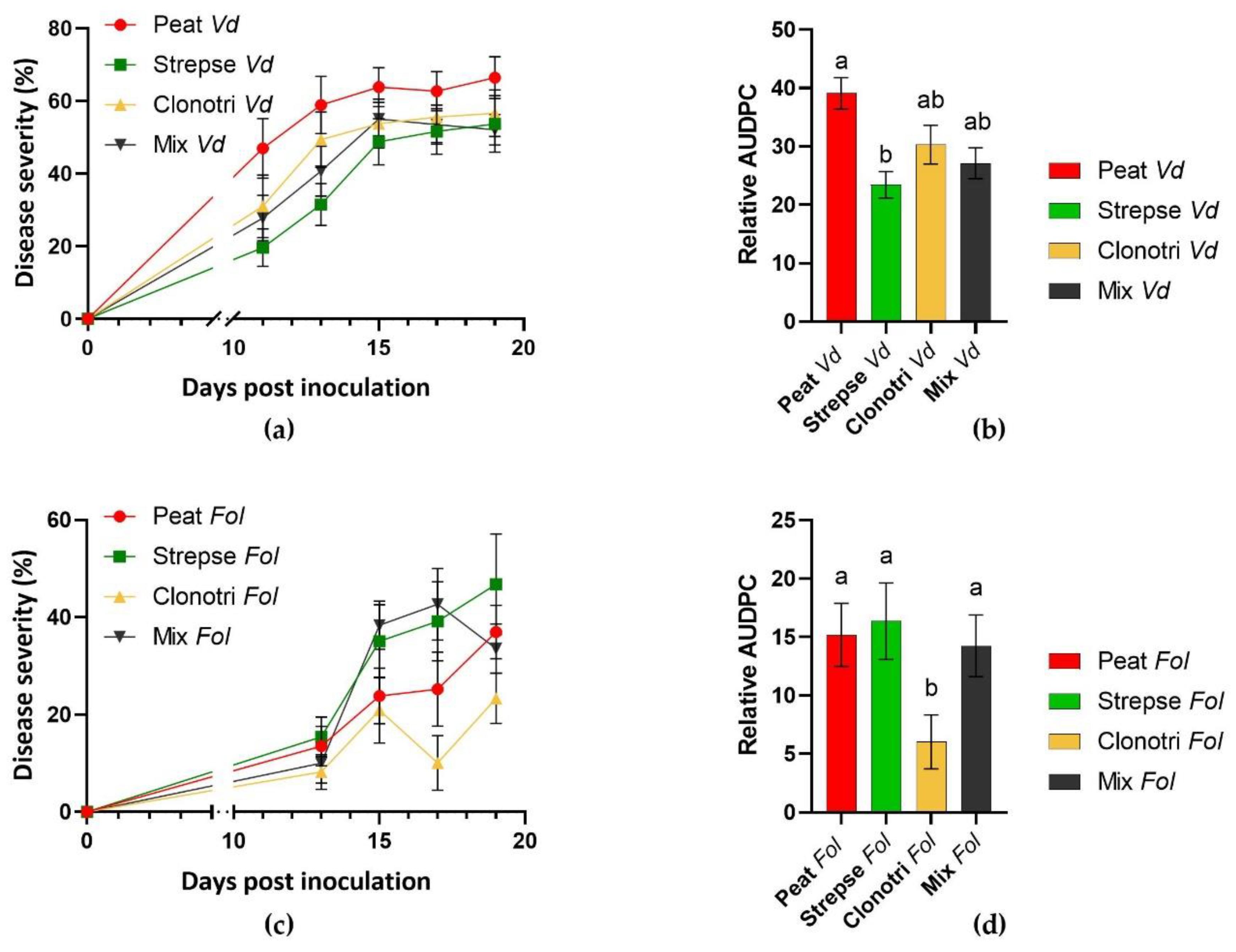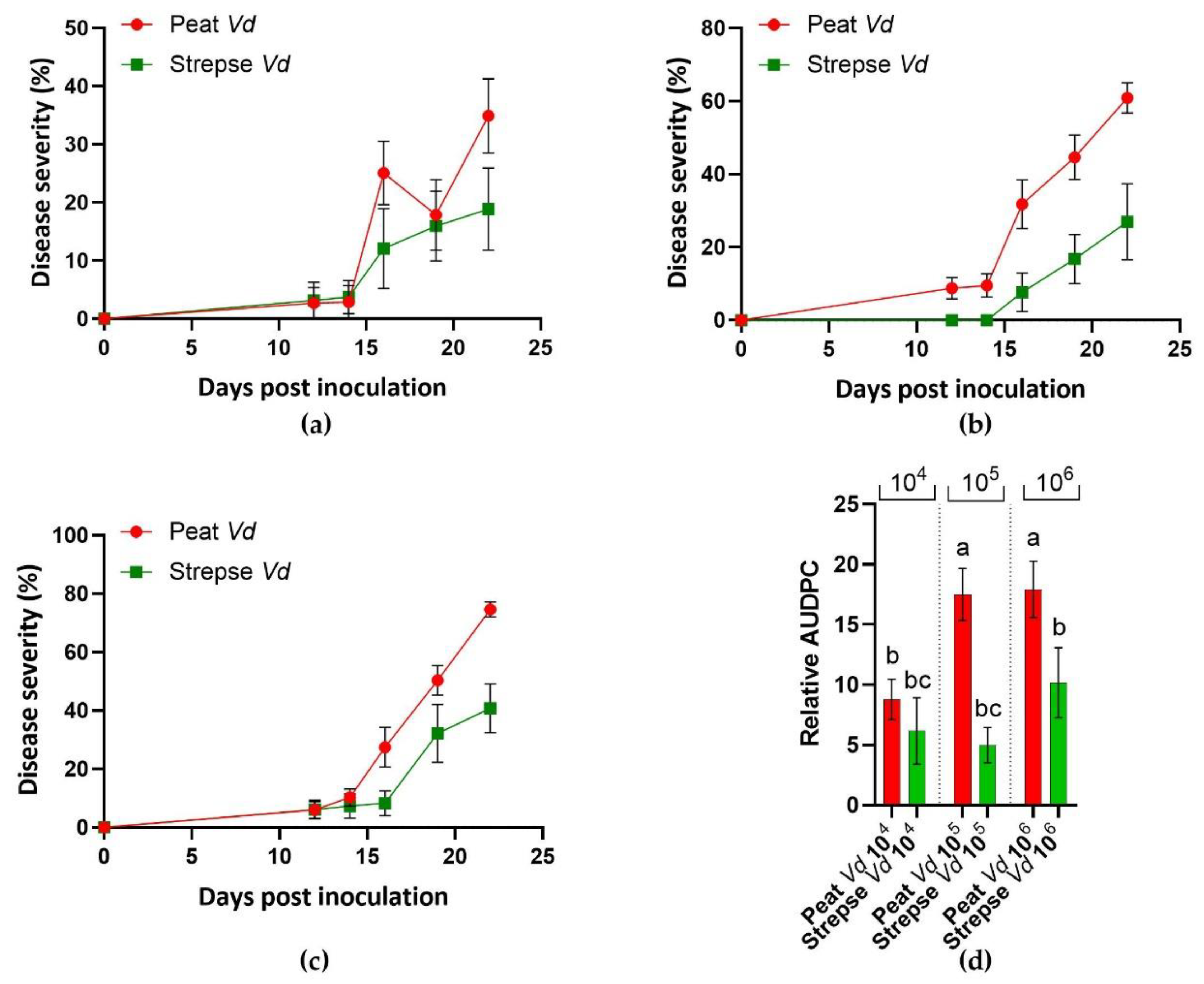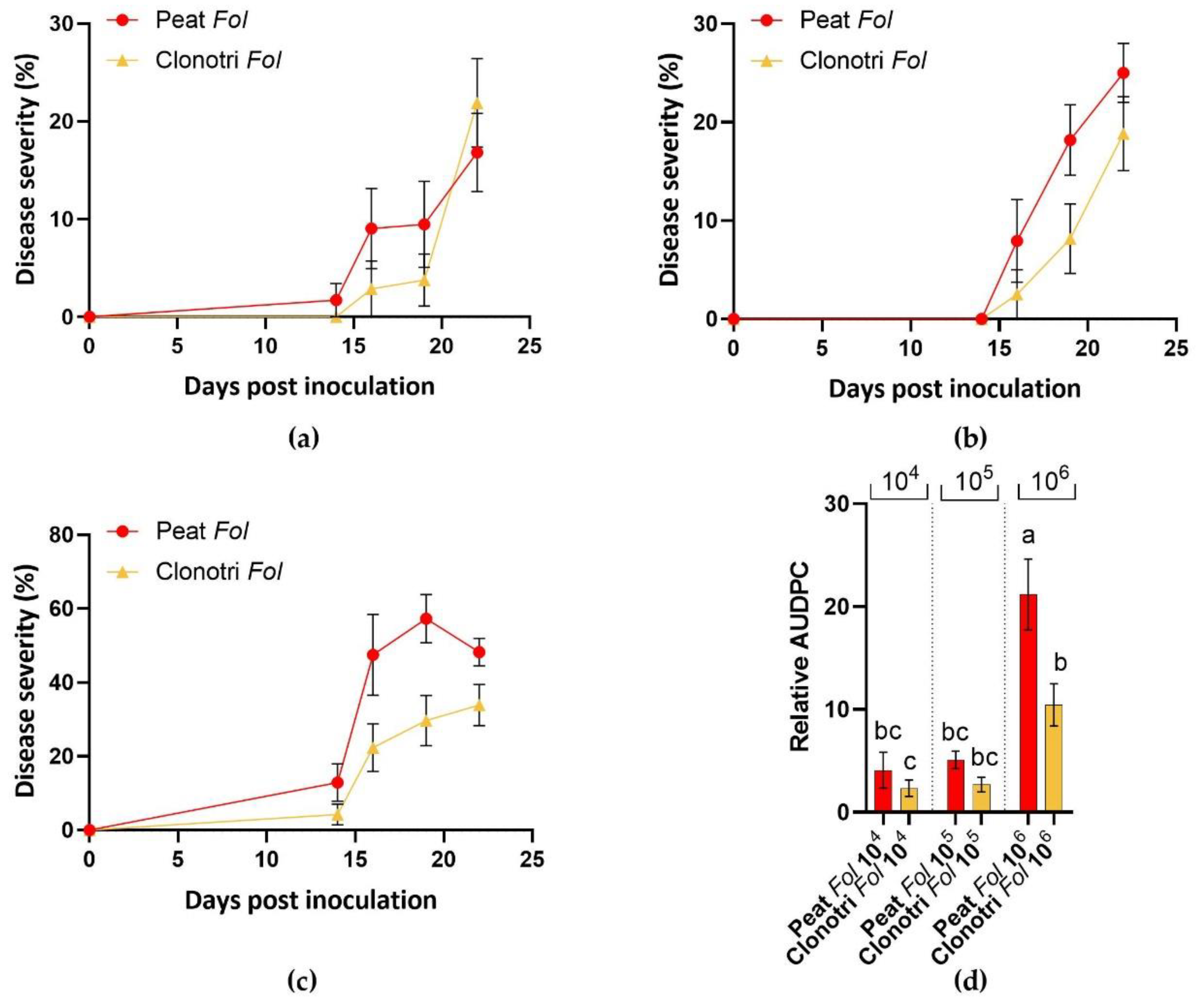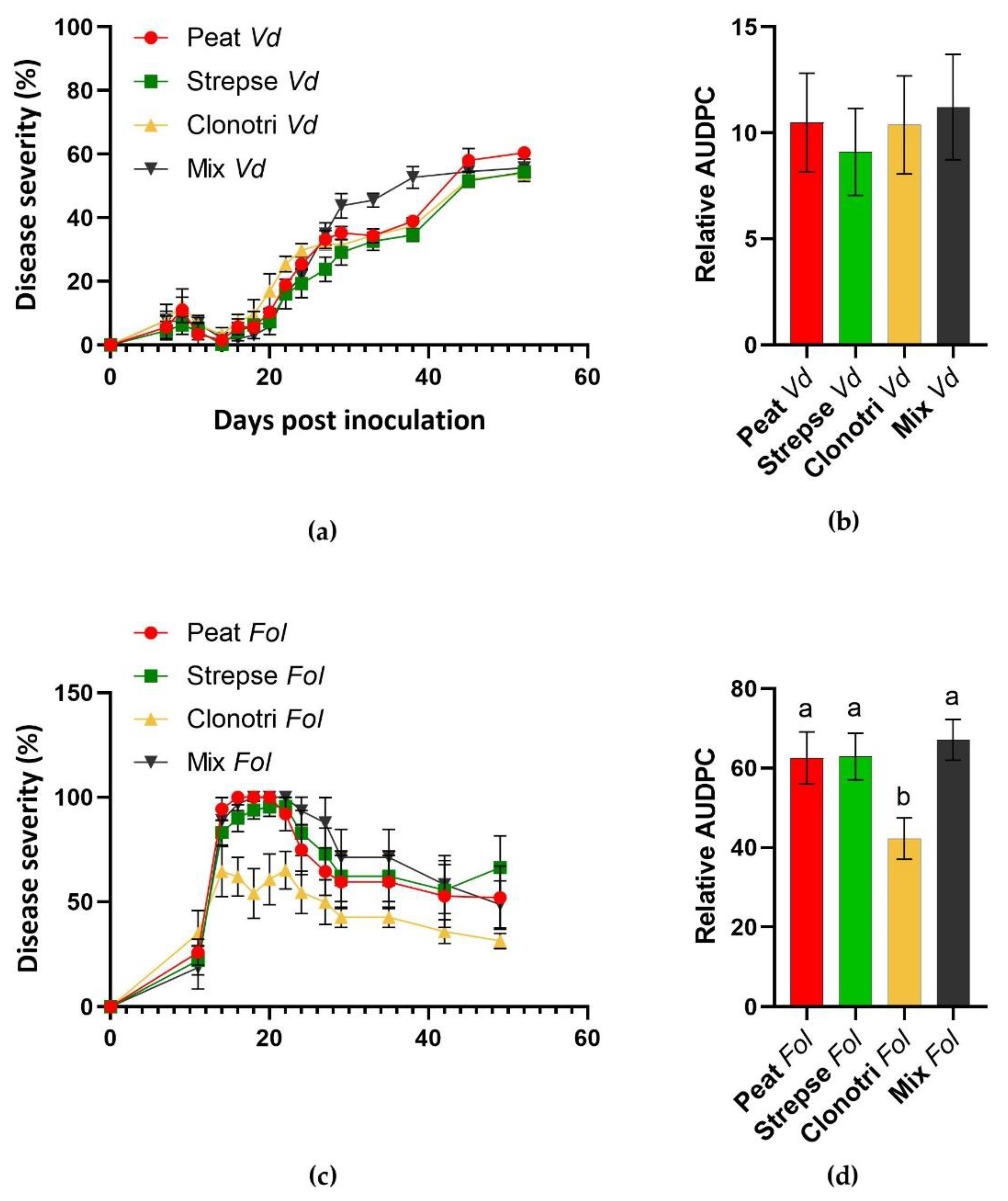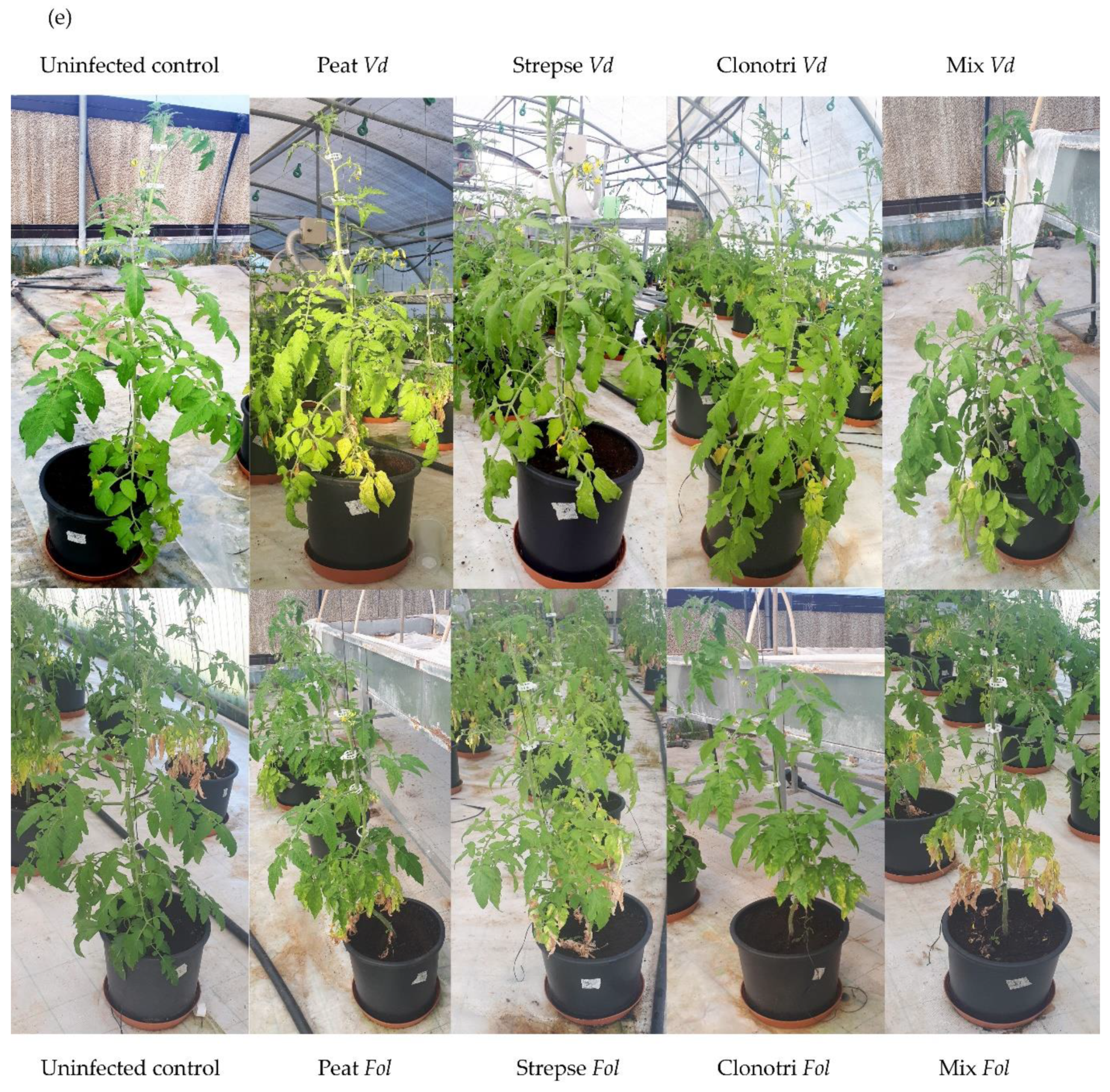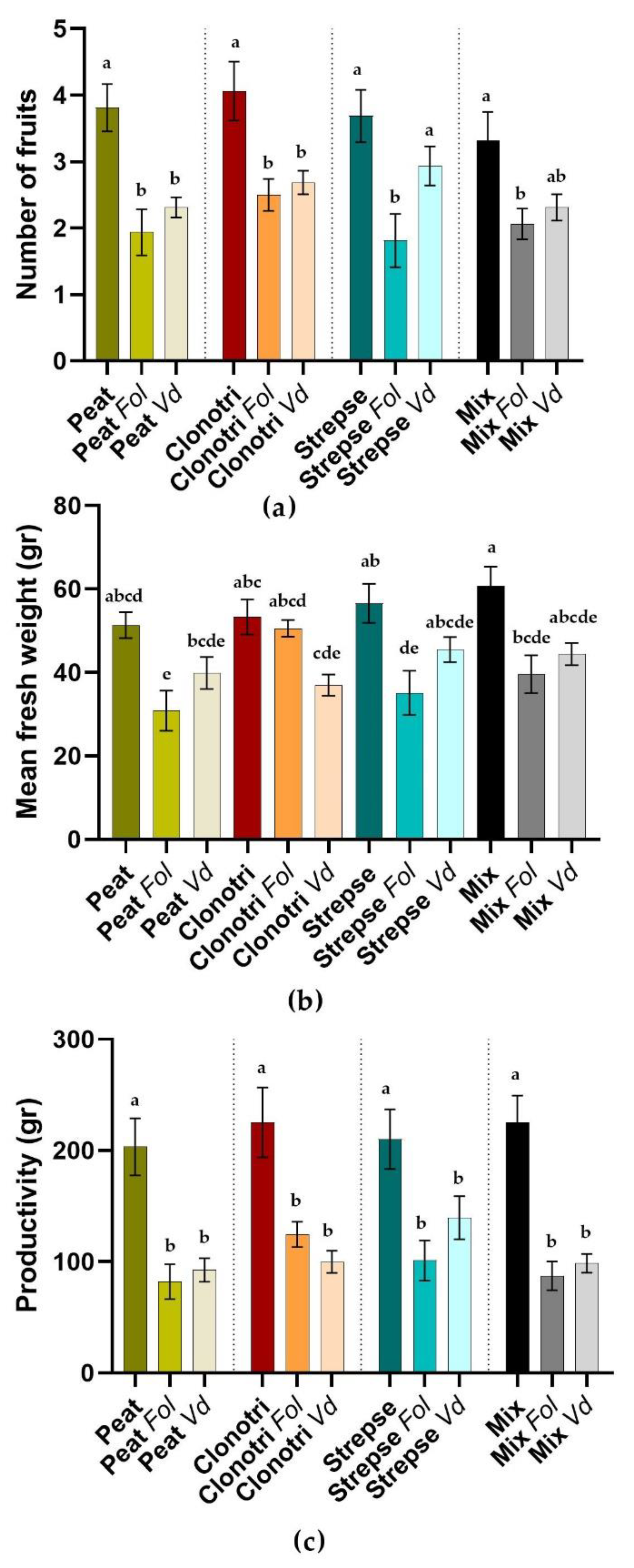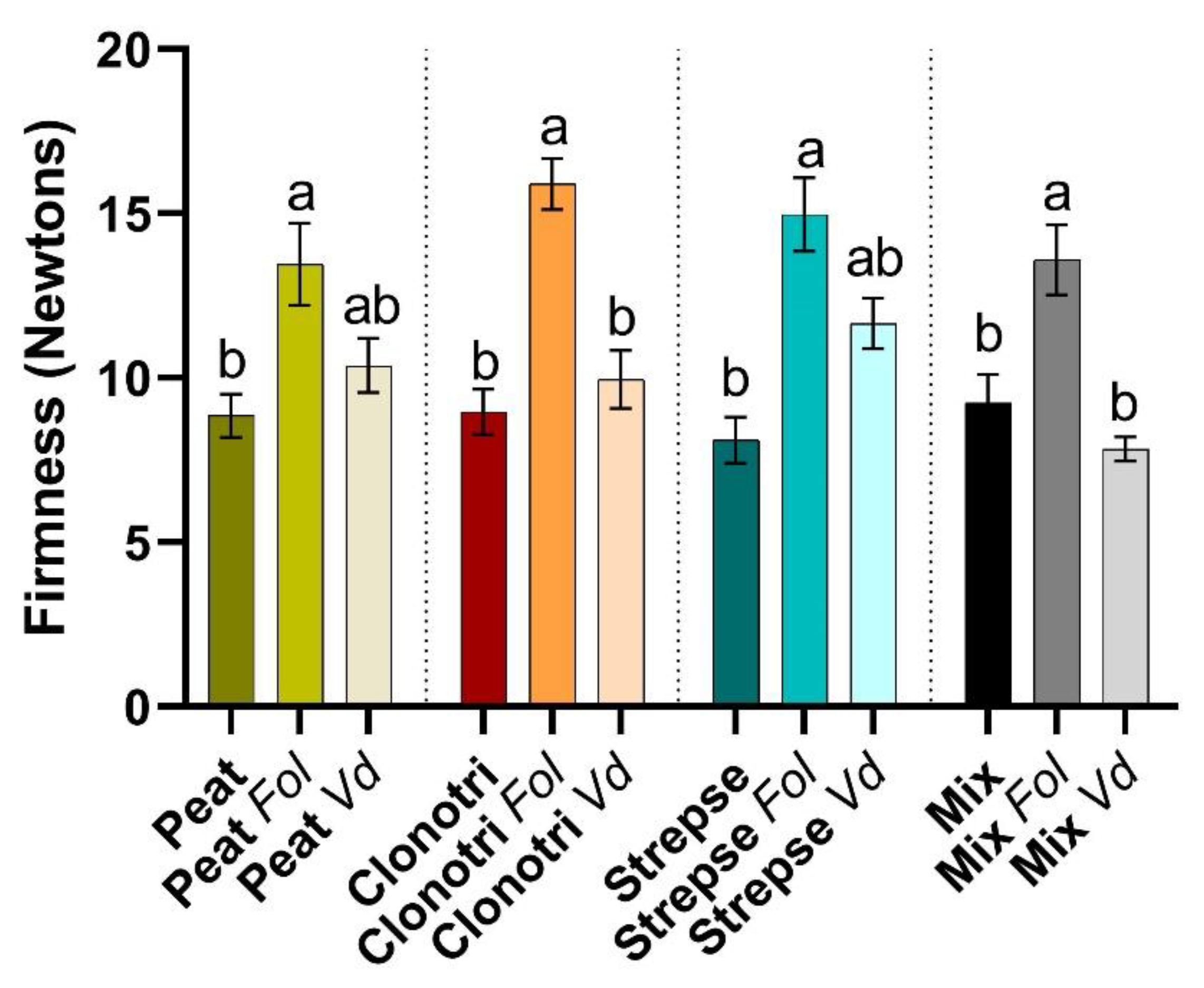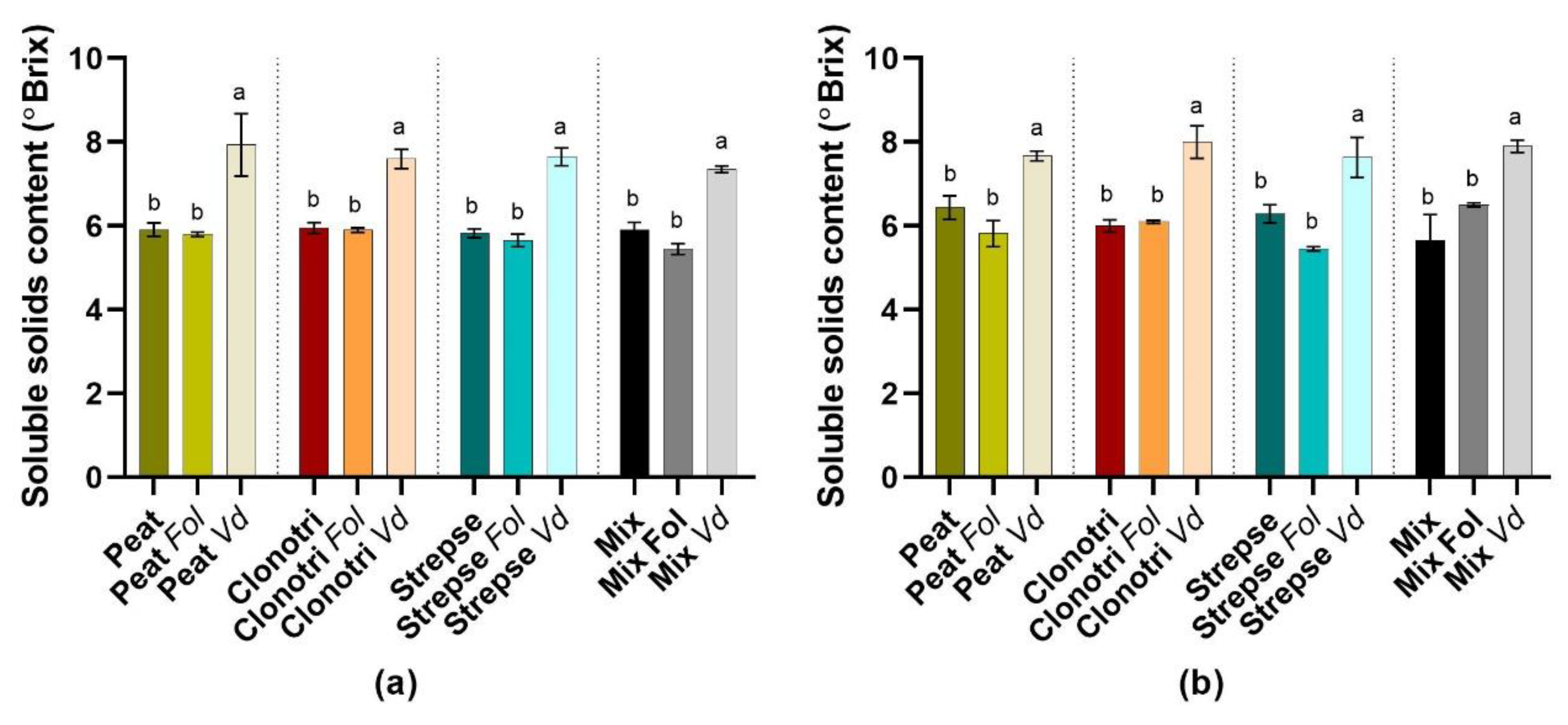1. Introduction
Verticillium dahliae (Vd) and
Fusarium oxysporum (
Fox), are two of the most destructive soilborne fungal pathogens that cause wilt diseases of many economically important crops leading to serious economic losses in production, including tomato [
1]. Both pathogens infect plants by penetrating the roots, entering the xylem and producing conidia that are transported to other parts of the plant through the xylem [
2,
3]. The invasion of these pathogens into the xylem vessels results in the plugging of the vessels by fungal and degraded cell wall material, disrupting water transport and causing symptoms that include wilting, yellowing of leaves, stunting, and eventually plant death [
4,
5,
6].
Controlling fungal wilts caused by these pathogens is difficult due to several factors. Firstly, once plants are infected no efficient treatments exist to prevent progression of the disease or cure the infected plants [
5,
7]. Secondly, both
Vd and
Fox can form long-lasting survival structures such as microsclerotia and chlamydospores, respectively, which allow them to persist in the soil for several years even in the absence of a susceptible host [
8]. Resting structures represent favorable targets for control through soil solarization and chemical fumigation. Nevertheless, limitations in large-scale implementation and the prohibition of chemical fumigants due to concerns surrounding public health and environmental implications render these approaches unsuitable [
9]. In addition, the application of pesticides frequently proves inadequate due to limited accessibility within the soil matrix [
10]. Several strategies have been developed and implemented for the management of fungal wilts. Crop rotation, soil solarization, the use of resistant cultivars and grafting on resistant rootstocks are commonly employed practices to reduce the incidence of
Vd and
Fox wilts [
11,
12,
13,
14,
15]. Another promising strategy for managing fungal wilt pathogens is the utilization of biological control agents (BCA). BCA include various microorganisms, such as certain strains of bacteria or fungi, that can be used to suppress the growth and activity of the pathogens through various mechanisms, including competition for nutrients and space, production of antifungal compounds, induction of systemic resistance in plants, and enhancement of plant growth and vigor [
16]. When applied to the rhizosphere or as seed treatments, BCA can establish a protective presence, preventing or reducing the colonization and infection of plant roots by fungal pathogens. Additionally, the use of biological control agents offers several advantages over chemical pesticides, including their environmental friendliness, reduced negative impacts on non-target organisms, and the potential for long-term sustainable disease management [
17]. However, the effectiveness of biological control agents can vary depending on factors such as environmental conditions, application methods, and compatibility with other management practices [
18]. The efficacy of biocontrol can be influenced by numerous interactions such as variability between plants, fields, and years and often limited efficacy and inconsistent field performance have been reported [
19]. Therefore, further research is essential to optimize the use of these biological control agents under different environments and production conditions and integrate them into comprehensive disease management strategies for sustainable agriculture.
This study investigates the effectiveness of two commercially available biocontrol formulations, Clonotri and Strepse (MS BIOTECH), in managing fungal wilt pathogens, Vd and Fol, in tomato plants grown under greenhouse conditions. The primary objective is to evaluate the potential of these formulations to mitigate disease severity caused by these fungal pathogens. Additionally, we aim to assess the impact of the biocontrol treatments on fruit yield and quality.
2. Materials and Methods
2.1. Plant Material and Growth Conditions
Tomato (
Solanum lycopersicum) cv. Ailsa Craig (Thompson & Morgan Ltd) was used in the experiments. Seeds were sown directly into 10.5 cm diameter pots, each containing approximately 500 cm
3 sterilized peat-based potting substrate (Plantobalt substrate 2, Plantaflor) [
7]. The pots were placed in a controlled growth room (25°C; 16 h light, 8 h dark; 65%–70% RH; light intensity 300 μmol m
−2 s
−1 at pot height) and received watering individually every second day with equal volume of water.
2.2. Biocontrol Formulations
In the present study two biological formulations were evaluated against the fungal wilt pathogens of tomato. The commercial products Clonotri and Strepse (MS BIOTECH) are liquid formulations containing spores of Trichoderma sp., Clonostachys sp., and Glomus sp. and Streptomyces sp., Pseudomonas sp., and Glomus sp., respectively. According to the product labels, the formulations require activation with Nutryaction, an organic fertilizer containing yeast and brown algae extracts (MS BIOTECH), for any effect and cannot be applied directly for plant protection. To achieve this, they were mixed with water and Nutryaction and the mixing ratio was 1 part biocontrol formulation: 13 parts water: 2 parts Nutryaction (v/v). These mixtures were prepared at least 8 hours prior to application on plants.
2.3. Fungal Strains and Inoculum Preparation
The fungal isolates of
Vd (race 1 isolate 70V) [
20] and
Fol (race 1 isolate Fol004) [
21] were used in this study. Fungal isolates were cryopreserved as an aqueous 20% glycerol suspension at −80°C. Before being used fungal strains were activated on potato dextrose agar (PDA, Merck) at 25°C for 5 days. For the pathogenicity experiments, conidia were prepared by transferring pieces from the growing edge of the fungal colony of each pathogen in sucrose sodium nitrate (SSN) [
22] in Erlenmeyer flasks and incubated in an orbital shaker at 150 rpm in the dark for 5 days.
Vd was grown at 22°C and
Fol at 25°C. Liquid cultures were passed through cheesecloth to remove mycelia. Suspensions were centrifuged at 10,000 x
g, 8°C for 10 min, and resuspended in sterile distilled water (SDW).
2.4. Pathogenicity Experiments in Growth Room
We performed two separate growth room experiments. In the first pathogenicity experiment the two formulations were initially evaluated under growth room conditions against Vd and Fol. The treatments of this experiment were as follows:
(a) Peat: plants grown in peat-based potting substrate only, serving as the control treatment. Peat is a standard choice in plant growth studies investigating disease control as it reflects a scenario where plants are not treated with any additives or biocontrol products,
(b) Strepse: plants grown in Peat that received activated Strepse formulation,
(c) Clonotri: plants grown in Peat that received activated Clonotri formulation,
(d) Mix: plants grown in Peat that received a mixture of activated Strepse and Clonotri formulation.
Application of treatments was performed twice via root drenching, 7 and 14 days after seedling emergence (10 ml/plant in each application). Control plants were root drenched with 10 ml H2O only. Plants were artificially inoculated at the third leaf stage (~20 days after seedling emergence) by root drenching with 20 ml of conidial suspension of Vd or Fol. This method involved pouring the conidial suspension directly onto the root zone of the plants in their pots. Conidial concentration was adjusted to 106 conidia/ml for Vd and 107 conidia/ml for Fol before being applied to the plants. Control plants were mock inoculated with 20 ml sterile distilled water. Plants were arranged in rows and columns in a completely randomized design and were rotated within the growth room every second day before watering. The plants were watered individually every second day with equal volume of water.
Disease severity was calculated by the number of leaves showing typical symptoms (wilting, yellowing and browning of leaves) as a percentage of the total number of leaves of each plant. Symptoms were periodically recorded for 19 days post inoculation (dpi) for both pathogens. Disease ratings were plotted over time to generate disease progress curves. The area under the disease progress curve (AUDPC) was calculated by the trapezoidal integration method [
23]. Disease was expressed as a percentage of the maximum possible area for the whole period of the experiment, referred to as relative AUDPC. The experiment was repeated three times with 10 replicates per treatment.
In the second experiment, based on the results of the first pathogenicity experiment, Strepse was evaluated against Vd and Clonotri was evaluated against Fol. In this experiment the efficacy of the products was assessed at three different pathogen concentrations, namely, 106, 105 and 104 conidia/ml. The experimental procedure was performed as described above with the exception of the three different pathogen concentrations. Apart from disease severity, plant height and total biomass of the plants were determined at 22 dpi (the last day of disease symptom monitoring).
2.5. Pathogenicity Experiments in Greenhouse
The efficacy of the biocontrol formulations was also evaluated under greenhouse conditions against
Vd and
Fol with pathogenicity experiments on tomato plants. This experiment was carried out in a greenhouse at the Agricultural Research Institute (35.140416, 33.383872, Nicosia, Cyprus) during the period from November 1, 2019, to March 10, 2020. The treatments of this experiment were the same as the first pathogenicity experiment in the growth room (described in paragraph 2.4) with 8 replicates per treatment. This experiment represents data collected during a single growing season (November 2019 - March 2020). Tomato plants cv. Ailsa Craig were initially grown in a controlled growth room as described previously (paragraph 2.1) and received the biocontrol treatments via root drenching, 7 and 14 days after seedling emergence (10 ml/plant in each application). Control plants were root drenched with 10 ml H
2O only. Plants were transferred to the greenhouse and were artificially inoculated with
Vd or
Fol at the third leaf stage (~20 days after seedling emergence) by root dipping. Briefly, the plants were removed carefully from their original pots while preserving the root ball. They were then immersed in a tray containing conidial suspension of
Vd or
Fol adjusted to 10
6 conidia/ml and 10
7 conidia/ml, respectively. Each plant remained in the tray for 10 minutes. This immersion method ensured a more thorough exposure of the entire root system to the pathogen inoculum. Control plants were immersed in H
2O for 10 minutes. Then the plants were transplanted into 15L pots with 30 cm diameter and filled with 3 Kg of peat-based potting substrate (Plantobalt substrate 2, Plantaflor). The pots were arranged in rows and columns in a completely randomized design and the plants were monitored for disease development and symptoms caused by
Vd or
Fol infection. Disease severity was assessed based on the percentage of leaves showing typical symptoms, and the Area Under the Disease Progress Curve (AUDPC) was calculated using the trapezoidal integration method as described in detail in section 2.4 [
23]. Symptoms were periodically recorded for 52- and 50-days post inoculation (dpi) for
Vd and
Fol, respectively.
The temperature inside the greenhouse during the experiment ranged between 14°C and 27°C. The temperature control within this range was achieved through appropriate greenhouse control systems (cooling/heating systems, humidity sensors, ventilation fans). In the initial stages of cultivation, the plants were irrigated daily, and as time progressed, they were irrigated every two days according to their water needs (the volume of irrigation water ranged from 600 ml during the establishment stage to 1L during the harvesting stage). This approach prevented excessive water drainage from the pots. Throughout the experiment, the plants were subjected to two additional interventions with the biocontrol formulations at 20 days intervals after pathogen inoculation, by mixing the biocontrol products with the irrigation water. During plant growth, vertical support was provided to the plants using greenhouse trellises, and any lateral shoots were promptly removed upon emergence. The onset of first flowering was observed around 35 days after transplanting the plants in the greenhouse, followed by the appearance of the initial tomato fruits approximately one to two weeks later (around 56 days after transplantation). Fertilization of the plants was applied twice during the entire experiment using Betabio Full organic fertilizer (ED&F Man Liquid Products MLP) mixed with the irrigation water, following the recommendations of the company that provided the biocontrol formulations for this specific greenhouse setup.
2.6. Quantity Attributes
Total number of fruits per plant was recorded for each treatment. Fruit was harvested and the total fresh weight of fruit was determined for each plant using a digital scale with an approximation to 0.01 g. Plant height was measured for each plant at the last day of the experiment (131 days after transplant) as the height above ground where the youngest fully expanded leaf joined the stem. Fresh weight of plants was measured for each plant 131 days after transplant using a digital scale with an approximation to 0.01 g. Number of leaves was counted for each plant 131 days after transplant (including removed, dead or fallen leaves).
2.7. Determination of Quality Attributes
The quality attributes of tomato fruits were determined in tomato fruits as described in previous work [
24]. Tomato fruits were harvested from the first two fruit sets, 117 and 131 days after transplantation to 15L pots.
The external fruit color was assessed at two equatorial areas of each fruit using a Konica Minolta CR-400 chromameter (Konica Minolta Sensing, Inc., Osaka, Japan). The equipment was set up for a D65 illuminant and a 10° observer angle. A white standard plate (Y = 94.00, x = 0.3158, y = 0.3322) was used for calibration. The values of L* (lightness), a* (green to red color), and b* (blue to yellow color) were determined for each treatment.
Firmness was evaluated by measuring the maximum penetration force for a 3-mm-diameter steel probe using a TA-XT2 texture analyser (Stable Micro Systems Ltd., Surrey, England). The fruits were placed so that the plunger penetrated the pericarp approximately 1 cm away from their geometric center to a depth of 10 mm at a rate of 5 mm/s. Results were expressed in Newtons (N).
Tomato fruits from each treatment were homogenized in blender and centrifuged in order to obtain a clear juice, Soluble solids content (SSC) was measured with a portable digital refractometer ATAGO Palette PR-32a (Atago Company Ltd., Tokyo, Japan). Titratable acidity (TA) was determined by potentiometric titration with 0.1 mol/L NaOH up to pH 8.2, using 5 mL juice diluted in distilled water until final volume of 50 mL. The measurements were carried out using a DL22 Mettler Toledo titrator (Mettler–Toledo, Inc., Columbus, Ohio, USA) and were expressed as g citric acid L-1.
2.8. Determination Total Phenolic and Total Flavonoid Contents
The phenolic contents of tomato fruits were extracted using ultrasound assisted extraction according with Ochoa-Velasco et al.[
25]. Approximately 5 g of tomato pulp were mixed with 20 mL methanol/water (80:20, v/v). The mixture was placed into ultrasound bath for 30 min at 30°C. After extraction, the mixture was centrifugated and the supermenant was collected to determine phenolic and flavonoid contents as well as the antioxidant activity.
The total phenolic contents were estimated using a microplate Folin-Ciocalteu assay. More specific, 50 µL of extracts were mixed with 50 µL of Folin–Ciocalteu reagent (1:5, v/v) and 100 µL of sodium hydroxide solution (0.35 mol/L) in each well. After a period of 3 min, the absorbance of each sample was monitored at 760 nm. A standard curve of gallic acid was prepared and results expressed as mg gallic acid equivalents (GAE)/100 gr tomato fruit.
The total flavonoid contents were also determined with employment of a microplate adopted photometric assay. An aliquot of 25 µL of the sample or standard solution was mixed with 100 µL distilled water and 10 µL of 50 g/L NaNO
2. After 5 min, 15 µL of 100 gr/L AlCl
3 was added to the mixture. Finally, aliquots of 50 µL of sodium hydroxide solution (1 mol/L) and 50 µL of distilled water were added after 6 min. The mixture was shaken for 30 s in the plate reader prior to absorbance measurements at 510 nm. A standard curve of rutin hydrate was prepared and the results expressed as mg rutin equivalents (RE)/100 gr tomato fruit [
26].
2.9. Determination β-Carotene and Lycopene Contents
Sixteen mL of acetone–hexane (4:6) solvent were added to 1 g of tomato pulp and were thoroughly mixed with employment of homogenizer (Ultra – Turrax, IKA T25). When the two phases were separated, an aliquot was taken from the upper phase and the absorbance at 663, 645, 505, and 453 nm was determined. Beta-carotene and lycopene contents were calculated according to the Nagata and Yamashita equations and expressed as mg/L [
27].
2.10. Determination of Antioxidant Activity
The 1,1-diphenyl-2-picrylhydrazyl (DPPH) assay was used to measure the scavenging activity of antioxidants against colorful radicals of DPPH. The reaction mixtures consisted of 30 µL of extracts and 200 µL DPPH methanolic solution (0.2 mM). The mixtures were incubated for 30 min; then, the absorbance was read at 515 nm. A standard curve of 6-hydroxy-2,5,7,8-tetramethylchroman-2-carboxylic acid (Trolox) was prepared and results expressed as µmol Trolox equivalent/100 gr tomato fruit.
The antioxidant activity of polar fraction of tomato fruits was also tested using Ferric Reducing Antioxidant Power (FRAP) measurements. More specific, 100 µL of the sample or standard compound were mixed with 180 µL FRAP solution (300 mM acetate buffer at pH 3.6, 10 mM 2,4,6-Tris(2-pyridyl)-s-triazine solution, and 20 mM ferric chloride solution in the ratio of 10:1:1, v/v/v) in 96-well plates. The reaction mixtures in well plates were allowed for 6 min at 37°C and the absorbance was read at 595 nm. A standard curve of iron sulfate (FeSO
4) was prepared and results expressed as µmol FeSO
4/100 gr tomato fruit [
25].
2.11. Statistical Analysis
Statistical analyses were performed using GraphPad Prism 8 for Windows (GraphPad Software, La Jolla, CA, United States). The type of ANOVA used depended on the experimental design:
One-way ANOVA was used for pathogenicity experiments where data were collected from groups with a single factor. Following the ANOVA, Tukey's post-hoc test (P ≤ 0.05) was used for multiple comparisons between groups.
Two-way ANOVA was employed for experiments where data were influenced by two independent factors. In these cases, the interaction effect between the two factors was also assessed. If the interaction was significant, Tukey's post-hoc test with adjustment for multiple comparisons (P ≤ 0.05) was used to identify specific significant differences between groups.
4. Discussion
Building upon the established knowledge of
Verticillium dahliae (
Vd) and
Fusarium oxysporum f. sp.
lycopersici (
Fol) as detrimental soilborne pathogens for tomato cultivation [
1], this study investigated the effectiveness of two biocontrol formulations, Strepse and Clonotri, in managing these pathogens under controlled conditions and greenhouse experiments.
Clonotri, a formulation comprising
Trichoderma and
Clonostachys microorganisms, exhibited significant protection against
Fol in both controlled conditions and the greenhouse, as indicated by reduced disease severity and relative AUDPC values (
Figure 1c,d and
Figure 4c,d). This is consistent with previous studies that have highlighted the role of
Trichoderma and
Clonostachys species in suppressing
Fol both in controlled conditions and greenhouse environments. Through a sequence of greenhouse experiments, the introduction of non-pathogenic strains of
Trichoderma into potting mix resulted in substantial disease control against
Fusarium wilt in tomato seedlings, with similarly effective outcomes observed using commercially available biocontrol products containing
Trichoderma spp. [
28]. Likewise, the effectiveness of
Trichoderma asperellum strain T34 against
Fol on tomato plants was demonstrated within a controlled environmental chamber experiment, revealing its efficacy across varying iron concentrations and its capacity to significantly reduce
Fol populations while safeguarding plants from
Fusarium wilt [
29]. Another study highlighted the potential of
Trichoderma isolates to augment the suppressive capacity of growth media in combating
Fusarium wilt of tomato, underscoring their ability to effectively mitigate the disease during the initial phases of plant development [
30]. Moreover,
Trichoderma asperellum demonstrated robust antifungal activity against
Fol, employing mechanisms such as chitinase activity and bioactive compound production, while also stimulating plant growth and fortifying tomato plants' resistance to
Fusarium wilt [
31]. Additionally, in a growth chamber study,
Clonostachys rosea isolate IK726 demonstrated effective control of seed- and soil-borne diseases, such as
Fusarium wilt. This effectiveness was particularly evident when roots were pre-inoculated with
Clonostachys. This finding highlights its capacity for systemic colonization, extending from roots to stems. [
32].
Clonotri, assessed in both growth room and greenhouse experiments, did not demonstrate effectiveness against
Vd. Despite the conducted trials, the biocontrol agent did not display significant control over the pathogen in either controlled environments (
Figure 1a,b and
Figure 4a,b). The efficacy of
Trichoderma-based treatments against
Vd infections appears to exhibit variable outcomes, as evidenced by the findings from various studies, including our own. In some instances,
Trichoderma interventions have demonstrated significant effectiveness in reducing
Vd colonization and subsequently improving crop yield. A study conducted over two consecutive years in potato fields demonstrated that the integration of
Trichoderma harzianum with other treatments led to a substantial reduction in
Vd colonization of stems, resulting in notable increases in potato yield. This trend was consistent across different cultivars, further emphasizing the potential of
Trichoderma-based strategies [
33]. Conversely, another study exploring
Trichoderma virens strains for their ability to induce resistance against
Verticillium wilt in cotton plants revealed a more nuanced scenario. While certain strains of
T. virens exhibited a significant reduction in disease severity ratings in
Verticillium-inoculated plants, indicating a potential for inducing systemic resistance, other aspects of the findings were inconclusive. Concentrations of terpenoid phytoalexins, indicative of a plant's defense response, were not consistently altered by
T. virens treatment in
Verticillium-inoculated plants. Moreover, the growth-promoting effects of
T. virens were evident in the absence of
Vd, suggesting a dual role of some
Trichoderma strains [
34]. These aspects highlight the complexity of the interactions between
Trichoderma strains, the target pathogen, and the surrounding environment. The variable outcomes across different studies, including ours, emphasize that the success of
Trichoderma-based approaches against
Vd is context-dependent. In contrast to
Trichoderma, the literature suggests that
Clonostachys-based treatments may not be the most suitable option for enhancing biological control of
Verticillium wilt. While a few studies have noted the biocontrol impact of
Clonostachys on
Verticillium wilt, instances of successful
in planta biocontrol reports remain scarce. Although certain
Clonostachys strains have demonstrated the ability to decrease microsclerotia viability under soil conditions, the literature offers limited accounts of effective
in planta biocontrol [
35,
36,
37,
38,
39].
The Strepse formulation, comprising
Streptomyces and
Pseudomonas microorganisms, showed efficacy against
Vd in controlled conditions (
Figure 1a,b) but was less effective in the greenhouse (
Figure 4a,b). Diverse
Streptomyces species have been extensively investigated for their potential as biological control agents against
Verticillium. Four strains isolated from diverse crop rhizospheres were assessed for their antagonistic impact on
Vd in cotton, demonstrating biocontrol efficiencies ranging from 19% to 66% under greenhouse conditions, and slightly lower efficiencies between 14% and 51% in field conditions, dependent on application methods [
40]. Co-inoculating
Arabidopsis thaliana seeds with
Vd and
Streptomyces lividans 66 effectively suppressed the fungus in soil, leading to reduced
Verticillium-induced disease symptoms [
41]. In greenhouse experiments with potato, tomato, and strawberry, various
Streptomyces species decreased disease incidence and severity [
42,
43,
44,
45]. However, the biofungicide Mycostop R based on
S. griseovirides K61 did not significantly protect tomato against
Vd [
46]. In addition to
Streptomyces,
Pseudomonas spp. show promise as biocontrol agents against various
Verticillium-induced diseases in diverse crops, with a substantial volume of data supporting their potential efficacy [
42,
43,
47,
48,
49,
50,
51,
52,
53]. Interestingly, while the results of our study indicated successful disease mitigation in controlled conditions for Strepse formulation, the efficacy was not consistently replicated in the greenhouse experiment which may be attributed to the complex and dynamic environmental factors present in that setting.
In the present study, Strepse did not exhibit effectiveness against
Fol. This finding contrasts with previous research highlighting the efficacy of other
Streptomyces isolates against this pathogen [
39,
47,
48,
49,
50]. However, other studies have also reported limitations in the effectiveness of
Streptomyces isolates [
54,
55]. These contrasting results suggest that the success of
Streptomyces isolates against
Fol may be influenced by various experimental conditions and contexts. Similarly, specific strains of
Pseudomonas have been well acknowledged as effective biological control agents against numerous fungal pathogens, including
F. oxysporum [
56]. Extensive examples can be found in the literature demonstrating various
Pseudomonas species safeguarding plants from
Fusarium wilt, spanning tomato infections and a variety of other plant hosts [
57,
58,
59,
60]. However, it is important to note that not all
Pseudomonas strains exhibit effectiveness against
Fol [
61].
Our results of the pathogenicity experiments, both in growth room and greenhouse, suggest promise for Clonotri as a biocontrol product for mitigating Fol infection. While Strepse did not reach statistical significance, it exhibits a trend towards reducing symptoms for Vd. The difference in efficacy of Strepse against Vd between controlled conditions and the greenhouse experiment can be attributed to several factors. Firstly, the controlled conditions in the initial experiment provided a more controlled and optimized environment for evaluating the biocontrol product. This controlled environment may have allowed for better establishment and performance of Strepse against Vd, resulting in significant protection observed. In contrast, the greenhouse experiment introduced more realistic and complex environmental conditions, including variations in temperature, humidity, and overall plant health. These factors can influence the interaction between the biocontrol product and the pathogen, potentially affecting the efficacy of Strepse. It is important to note that the lack of significant protection observed in the greenhouse experiment does not necessarily imply complete inefficacy of Strepse against Vd. It could indicate that the efficacy of Strepse is influenced by the specific conditions and dynamics of the greenhouse environment. Further investigations under various field conditions and with different cultivars are necessary to better understand the effectiveness of Strepse as a biocontrol agent against Vd.
The present study also investigated the influence of pathogen concentration on biocontrol efficacy. The evaluation of biocontrol products against different pathogen concentrations in a controlled environment provides valuable insights into their efficacy across a range of disease pressures. Building upon the findings from previous experiment, this phase aimed to understand how the biocontrol products Strepse and Clonotri perform when exposed to varying concentrations of
Vd and
Fol, respectively. In the case of Strepse against
Vd, AUDPC analysis indicated significant protection at higher pathogen concentrations (10
6 and 10
5 conidia/ml), while its protective effect was not significant at a low concentration (10
4 conidia/ml) (
Figure 2d). Similarly, Clonotri's efficacy against
Fol, as revealed by AUDPC analysis, was prominent only at the highest pathogen concentration (10
6 conidia/ml), with no significant protection observed at lower concentrations (10
4 and 10
5 conidia/ml) (
Figure 3d). The observed pattern of biocontrol effectiveness by Strepse and Clonotri may be related to the baseline disease severity at lower pathogen concentrations. Since plants without the biocontrol products exhibited relatively low disease severity in these conditions, the impact of these treatments on disease reduction might not have been statistically significant. This suggests that the effectiveness of these biocontrol agents against their respective pathogens depends on the level of inoculum pressure. It has been extensively demonstrated that the severity of fungal wilt disease symptoms correlates with increasing inoculum concentrations. In a pertinent study conducted by Shaw et al. [
62], strawberry genotypes previously classified as relatively susceptible, intermediate, and resistant to
Verticillium dahliae-induced wilt were inoculated with varying conidial concentrations (10
4, 10
5, and 10
6 conidia/ml). Consistent with our own investigation, their results revealed a proportional increase in overall disease symptoms with rising inoculum concentration. Specifically, the percentages of plants exhibiting stunting or mortality were 6.8%, 32.6%, and 44.9% for the three conidial concentrations, respectively. Furthermore, the study demonstrated that the categories of relative resistance were distinguishable at concentrations of 10
6 and 10
5 conidia/ml. However, no clear differentiation was observed at 10
4 conidia/ml, likely due to the relatively low disease severity at this specific concentration of the pathogen. It's worth mentioning that in our study the assessment of plant height and fresh weight, essential indicators of plant health and growth, revealed that the application of biocontrol products did not have any discernible effect on these parameters, irrespective of whether the plants were part of the control group or were inoculated with a pathogen (
Figures S3 and S4). Our results indicate that the protective potential of the biocontrol products is most pronounced when disease pressure is higher, demonstrating the interplay between biocontrol efficacy and baseline disease severity. Furthermore, the negligible impact on plant height and fresh weight emphasizes the lack of adverse effects on plant growth, affirming the potential of these products for sustainable disease management strategies.
In the context of plant growth and productivity, the application of biocontrol products did not significantly affect parameters like plant height, number of leaves, fruit number, and the overall productivity under greenhouse conditions (
Figure S5b,c and
Figure 5a,c). Interestingly, Clonotri-treated plants infected with
Fol displayed no significant difference in mean fresh weight compared to non-treated (Peat) and Clonotri-treated control plants (without
Fol infection) (
Figure 5b). This suggests a potential protective effect of Clonotri treatment on this fruit yield parameter against
Fol infection, which is consistent with the disease severity reduction observed in the pathogenicity experiment (
Figure 4d).
The greenhouse experiment also included an evaluation of the influence of the biocontrol products on fruit quality attributes. Interestingly, the application of biocontrol products did not have a substantial impact on parameters such as titratable acidity, total phenolic and flavonoid contents,
β-carotene and lycopene contents, and antioxidant activity (
Figure S7). However, fruit firmness was increased in the first fruit set in
Fol-infected plants compared to mock-inoculated plants, indicating that
Fol infection might influence the fruit's ripening process (
Figure 6). Similarly, the analysis of external fruit color revealed that
Fol infection resulted in a lighter appearance of the fruit and a noticeable shift towards green and yellow coloration (
Table 1). These effects are likely a result of
Fol's interference with the plant's vascular system, reduced water uptake, induced stress-related metabolic changes, and potential disruption of pigment synthesis pathways. Soluble solids content (SSC) was also influenced by pathogen infection, with
Vd-infected plants displaying increased SSC, possibly indicating enhanced metabolic processes related to fruit ripening (
Figure 7a,b). Verticillium wilt is known to impact the ripening process in infected plants, particularly in fruit-bearing crops like tomatoes. The induction of ripening in Verticillium-infected plants involves complex interactions between the pathogen and the host plant including the plant stimulation to produce ethylene, a key plant hormone involved in the initiation and acceleration of the ripening process [
63].
The results of this study offer valuable insights into the potential of biocontrol formulations to manage fungal wilt pathogens in tomato cultivation. The varied responses observed in different experimental conditions highlight the complexity of biocontrol efficacy, which can be influenced by pathogen specificity, environmental factors, and plant health. Further investigations under diverse field conditions, with different cultivars, and considering broader ecological interactions will be essential to fully harness the potential of these biocontrol strategies. In conclusion, this study provides a step forward in understanding the role of biocontrol products in mitigating the impact of fungal wilt pathogens, offering a sustainable and environmentally friendly approach to disease management in tomato cultivation.
